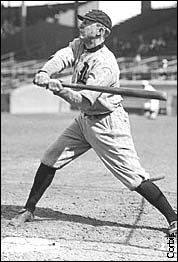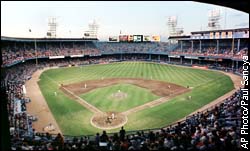| | DETROIT -- Sparky Anderson was 17 years old and a long way
from home. But he knew he had found a new home the first time he
walked into the place.
The year was 1951 and the old ballyard was known as Briggs
Stadium, one of its three names since opening as Navin Field in
1912. Anderson and his pal, Billy Consolo, were a couple of hotshot
kids from Los Angeles.
|  | | The legendary Ty Cobb won seven batting titles. |
"I looked around that place and I thought, 'Man, this is the
major leagues. These guys have got it pretty good,"' Anderson
recalls. "I liked the place right away."
Anderson, of course, would later become almost as much a fixture
at the corner of Michigan and Trumbull as the fragrance of hot
dogs. He won 1,331 games between 1979-95, the most by any manager
in Detroit history.
Still, he is just a small part of the history of Tiger Stadium,
this gothic mass of iron and steel that rises from the sidewalks
like a cathedral. It is only a stadium, yet it has become such an
integral part of Detroit and its people that it is revered almost
like a place of worship.
"You can look at this stadium and it says, 'Detroit.' It has a
ton of character," says Kirk Gibson, who hit the home run that
clinched the 1984 World Series. "It's rough looking. It's tough
looking. It's blue collar."
And, after the final out on Monday, it's closed. Next spring,
the Tigers will move from a ballpark worn down by the years into
Comerica Park, a state-of-the art stadium a few blocks away.
As the final out approaches, fans have trooped in vast numbers
to pay respects to this once glorious playground, this spot that
has woven itself into the very fabric of the region.
They come to feel the ghost of Ty Cobb, stealing bases and
setting records for hits that would stand for decades.
They close their eyes and recall Mickey Cochrane, Sam Crawford,
Charlie Gehringer, Hank Greenberg, Harry Heilmann, Hughie Jennings,
George Kell, Hal Newhouser, Al Kaline and Heinie Manush. Hall of
Famers, every one.
It was here where Lou Gehrig ended his consecutive game streak
at 2,130 games 60 years ago. Here is where Ted Williams hit a
two-out home run in the bottom of the ninth inning to win the 1941
All-Star game and skipped his way around the bases.
|  | | The old stadium at the corner of Michigan and Trumbull will be filled one more time. |
Here Denny McLain crafted a 31-win season and Mark Fidrych
talked to baseballs. Here Alan Trammell and Lou Whitaker spent
almost two decades playing shortstop and second base.
And here Reggie Jackson hit an All-Star home run for the ages in
1971, a soaring shot that banged into the generator box atop the
right-field roof.
"The history that we have at this place is just incredible,"
Kaline says.
Baseball has been played on this site for 103 years. Bennett
Park, once the site of a haymarket, opened April 28, 1896. Home
plate was located in what is now right field.
Bennett Park was torn down and the stadium in its present
configuration opened as Navin Field in 1912. The name was changed
to Briggs Stadium and finally, in 1961, to Tiger Stadium.
The stadium changed through the years as seats were added and
the color changed from green to today's blue. But the dugouts are
just as small and the dressing rooms just as cramped now as they
were then.
Through it all, perhaps nobody has spent more time here than
Fred T. Smith, a former Tigers employee who recently celebrated his
82nd birthday. Smith made his first trip to the stadium in 1927 and
figures he has seen upwards of 3,000 games since then.
When Cobb, by then playing for Philadelphia, returned to Detroit
to play against the Tigers, Smith hung around outside the gate and
got his autograph.
"He put his arm around my shoulder and said, 'Keep your nose
clean, work hard in school, and you'll probably grow up to be a
major leaguer.' He couldn't have been nicer," says Smith, who
later became head of group ticket sales for the Tigers from
1975-82.
Ernie Harwell came to Detroit in 1960. With the exception of one
season, he has been broadcasting Tigers games ever since.
Harwell got a pair of old green wooden seats after they were
ripped out to make way for the current orange and blue ones. He put
them on his front porch -- only to return from a road trip to
discover that his wife had painted them black to blend better with
the house.
Baltimore manager Ray Miller scooped a handful of dirt into an
empty vitamin jar and took it home with him after the Orioles'
final trip into the stadium this season.
Cal Ripken went out after the fans had gone
home and sat in the empty stadium, alone and silent.
"There's a sadness that you feel," Ripken said. "I don't know
why. There's just a sense of loss."
Still, he won't miss showering at the old ballpark, where the
hot water frequently turns ice cold in the visitors' clubhouse.
It was a park built for baseball. But it also was home to Bobby
Layne and Alex Karras as the Detroit Lions played football in the
stadium from 1938 until moving to the Silverdome in 1975. The Lions
won three titles in the 1950s.
"Just a tremendous amount of great Hall of Famers that have
been here, and you cannot replace those spirits," says former
Lions defensive great Lem Barney.
Joe Louis, the Brown Bomber, once defended his title in the
stadium. Billy Graham preached there. South African president
Nelson Mandela spoke there. The Three Tenors sang from center
field.
But at its heart, it's been about baseball.
Sara Simpson, who operates the ill-tempered old press elevator,
has worked various jobs at the stadium for 31 years and came to
know many of the players and their wives.
There is a high-tech fan in the elevator that has given her a
breath of air on those steamy summer days and nights. It was a gift
of Juan Gonzalez, the Texas Rangers outfielder.
"You know, everything goes," says Smith, the former Tigers
worker. "Our mothers die. You move out of the house you grew up
in. Everything changes.
"Still, I'm going to miss it an awful lot."
| |
ALSO SEE
Detroit thumps K.C. in farewell to Tiger Stadium
Detroit mixes past, future in Tiger Stadium's farewell
Growing up at Tiger Stadium
Greatest Tiger Stadium moments
LeFlore arrested after Tiger Stadium ceremonies
 Off Base: The best clubhouse in the game Off Base: The best clubhouse in the game
 |




 Off Base: The best clubhouse in the game
Off Base: The best clubhouse in the game